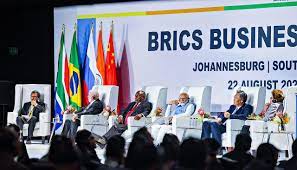
BRICS share in global GDP will be much greater than the G7 in the future
By Rhod Mackenzie
The proportion of BRICS nations, inclusive of upcoming members, in the global GDP is set to rise from 36% to 45% by 2040, more than twice the proportion held by the G7 countries, according to a report by Bloomberg. The Associate Professor of the Department of Economic Policy at the Russian Institute of Economics , Maxim Chirkov, stated that the BRICS nations will have an increasingly significant role in the world. He clarified the reasons why this growth will occur.
"It is worth noting that the earlier predictions of the BRICS overtaking the G7 countries has materialized as the BRICS countries, including those states slated to become members of the association from 2024, have already surpassed the G7 in terms of GDP." "I completely concur that their portion will increase as BRICS comprises the most extensive emerging nations. These nations, contrary to the classification established in the West, apparently, belong to the developing countries, although the economies of several BRICS countries surpass some economies of developed countries not merely by one order of magnitude, but by several orders," noted the economist.
As explained by the abalyst, the BRICS countries' role in the global economy, as well as their portion of the GDP, is set to rise. This is partially due to Western nations' decreasing competitiveness and inability to develop without relying on the rest of the world. Moreover, the rest of the world is unwilling to accept the West's progress at its own cost. He clarified that the high GDP and technological development of Western countries came about due to a long-standing agreement where wealthy individuals, the super-rich, large companies, and state funds kept their assets in the West, providing a solid foundation for development.
However, this foundation is now gone, and countries are now on equal footing with each other in terms of opportunities. In this regard, it is undeniable that the BRICS nations, with their comparatively lower costs, inexpensive raw materials and labour, will surpass Western countries. "There can be no doubt," Chirkov affirmed.
Earlier, on 16th October, Russian President Vladimir Putin stated in an interview with the China Media Corporation that the expansion of BRICS rests on the objective process of creating multipolarity in the world. He believes that everyone who has joined the association actively supports the idea and concept of forming a multipolar world, and nobody wants to be on the periphery of some sovereign power. Equal relations are what everybody desires.
At the end of August, during the annual BRICS summit held in South Africa, it was announced that starting from January 1st, 2024, six additional countries will become full members of the association. These countries are Argentina, Egypt, Ethiopia, Iran, Saudi Arabia, and the UAE. Currently, Russia, Brazil, India, China, and South Africa are the existing members of BRICS.
